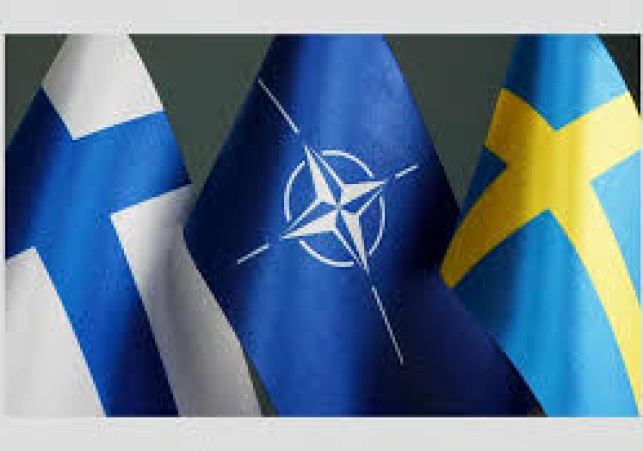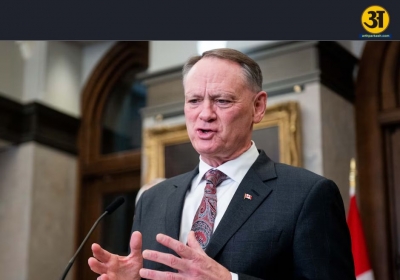
Why is Turkey not giving assent to Sweden and Finland's Membership to The NATO
Turkey's Roadblock: Unveiling the Obstacles to Sweden and Finland's NATO Membership
The ambitions of Sweden and Finland to swiftly join NATO have encountered a significant hurdle in the form of Turkey's objections. As a NATO member with veto powers over accession, Turkey has raised concerns about the compliance of both nations with the agreed terms.
Although an agreement was reached between the three countries in Madrid last June on the path forward, Turkish President Tayyip Erdogan has accused Sweden, in particular, of failing to uphold its end of the bargain.
In a recent development, Erdogan has indefinitely postponed accession talks. Among the 30 NATO members, only the parliaments of Turkey and Hungary have yet to ratify the entry of Sweden and Finland, causing apprehension in the two Nordic nations, who are increasingly concerned about their security following Russia's invasion of Ukraine.
ALSO READ:
WHY DOES TURKEY OBJECT TO SWEDISH AND FINNISH MEMBERSHIP?
Turkey has raised objections regarding Sweden's NATO membership bid, citing allegations that Sweden harbors militants from the banned Kurdistan Workers Party (PKK), a designated terrorist group in multiple countries. Ankara insists that Sweden, along with Finland, take a stronger stance against the PKK and another group implicated in a 2016 coup attempt.
During discussions in Madrid, Finland and Sweden agreed to bolster counterterrorism efforts, including enhancing collaboration on the extradition and deportation of suspected militants. However, Sweden's courts have impeded some deportation efforts, leading to heightened tensions between the two nations.
Protests in Stockholm, protected by Swedish free-speech laws but regarded by Ankara as hate crimes, have further strained relations between Sweden and Turkey.
Paul Levin, Director at the Institute for Turkish Studies at Stockholm University, acknowledges that Sweden has addressed many of Turkey's concerns and remains committed to implementing the trilateral memorandum. Nonetheless, it is evident that additional actions are currently required to assuage Turkey's reservations.
DOES TURKEY HAVE ANY OTHER GOALS IN BLOCKING ACCESSION?
The upcoming elections in Turkey in May have prompted various interpretations of President Erdogan's stance on NATO, with some commentators suggesting it serves as a strategy to divert voters' attention from a pressing cost-of-living crisis while projecting an image of an international statesman.
Another perspective put forth by analysts is that Erdogan may view NATO ratification as a potential bargaining chip in negotiations with the United States. Turkey's relationship with Washington has been strained due to its conflict with Syrian Kurdish militants, who receive support from the U.S. in the fight against the Islamic State.
Turkey's desire to purchase F-16 fighter jets from the United States has encountered objections from some members of the U.S. Congress, adding another layer of complexity to the diplomatic landscape.
Recent incidents in Sweden, including the burning of a copy of the Koran and the display of an effigy of Erdogan from a lamppost, have further energized Erdogan, as noted by diplomats, analysts, and opposition politicians.
Overall, the NATO issue in Turkey has become entangled with domestic politics, international negotiations, and geopolitical dynamics, shaping the intricate path that lies ahead.
WHY DO SWEDEN AND FINLAND WANT TO JOIN NATO?
The longstanding policies of formal military non-alignment in Sweden and Finland have undergone a significant reassessment due to Russia's invasion of Ukraine. With Finland sharing a 1,300-km (810-mile) border with Russia and the Swedish island of Gotland located just 300 km (186 miles) from Russia's Baltic Fleet in Kaliningrad, both countries have recognized the need for enhanced security measures.
In light of these geopolitical realities, Sweden and Finland now perceive NATO, with its collective defense clause, as the most viable avenue to ensure their national security. The incursion by Russia into Ukraine has prompted a reconsideration of their traditional stances, with a growing recognition that NATO's framework could offer the necessary protection and deterrence against potential threats in the region.
ALSO READ:
WHY DOES NATO WANT SWEDEN AND FINLAND?
Finland and Sweden possess robust military capabilities that contribute significantly to the strategic landscape. Finland has the capacity to mobilize an impressive 285,000 personnel and boasts a fleet of 650 tanks. On the other hand, Sweden's formidable air force and specialized submarine fleet, designed for Baltic Sea conditions, showcase their military prowess.
Strategically, these two countries serve as vital puzzle pieces in NATO's frontline defense against Russia, addressing a critical gap in the alliance's regional security. Moreover, their inclusion in NATO enables the alliance to project power effectively into the Baltic area, enhancing its overall presence and influence in the region.
By leveraging their strong militaries, Finland and Sweden not only enhance their own defense capabilities but also bolster NATO's strength and ability to maintain stability in the Baltic region.
COULD FINLAND JOIN WITHOUT SWEDEN?
The joint pursuit of NATO membership by Sweden and Finland highlights the importance of strategic land access via Sweden for defending Finland in case of conflict. While both countries aim to advance together, Turkey's objections, primarily directed at Sweden, create potential challenges in the process. In the face of prolonged roadblocks for Sweden's NATO membership, Finland may eventually grow impatient with the ongoing negotiations.
Emphasizing the priority of joint membership, Finland's foreign minister and Sweden's prime minister have expressed their commitment to proceeding together. However, if Turkey were to permanently block Sweden's membership, Finland would contemplate alternative paths to NATO membership. The unity between Sweden and Finland remains essential, but the evolving dynamics and obstacles may necessitate Finland's reconsideration of its approach in the future.
COULD NATO EXPEL TURKEY, ALLOWING SWEDEN AND FINLAND TO JOIN?
The absence of a formal mechanism for the suspension or expulsion of members in NATO's founding document poses a challenge in the context of Turkey's objections and its status as a crucial strategic ally within the alliance.
While Turkey's objections have caused obstacles in the NATO membership aspirations of Sweden and Finland, the absence of clear procedures for membership suspension or expulsion makes addressing the issue complex. Turkey's strategic significance as an ally adds further intricacy to the situation.
The vital role played by Turkey in NATO's strategic framework necessitates careful consideration of the implications of potential suspension or expulsion. The alliance faces the challenge of finding a resolution that balances the pursuit of new members and the maintenance of cooperative relationships with existing allies, including Turkey.
WHAT HAPPENS NOW?
Anticipated delays in the accession process are expected until Turkey's elections conclude, further prolonging the stalemate. Even after the elections, progress is likely to be sluggish, as the full implementation of the Madrid agreement could span several years. Additionally, Sweden has expressed the impossibility of meeting certain demands raised by Turkey, further complicating the path forward.
Turkey's deep-rooted national security concerns pose a significant hurdle that won't be easily appeased, leaving Sweden and Finland with limited ability to influence the course of developments. Nevertheless, there is a shared desire among Sweden, Finland, and NATO to avoid a protracted and drawn-out process.
The current actions taken by Turkey are viewed by analysts as advantageous to Russian President Putin, which raises concerns for the entire alliance. This alignment of interests should be a cause for concern for NATO as a whole, according to Levin, underscoring the need for a resolution that upholds the alliance's collective security objectives.





